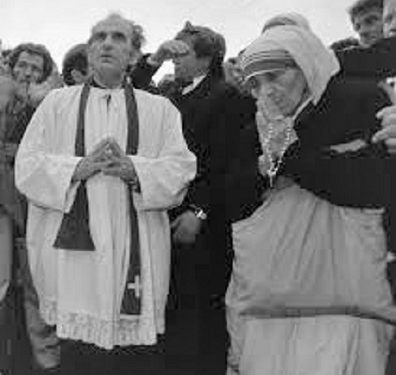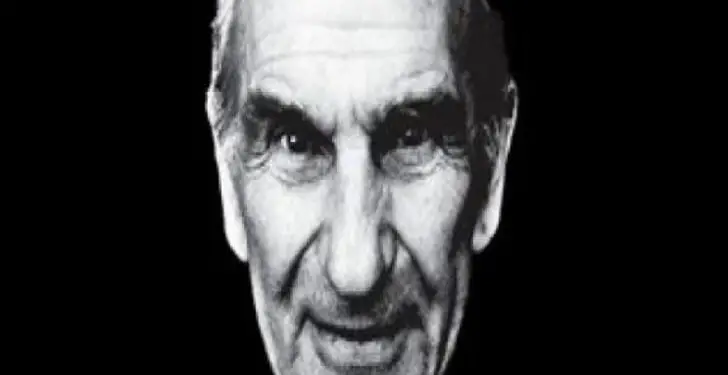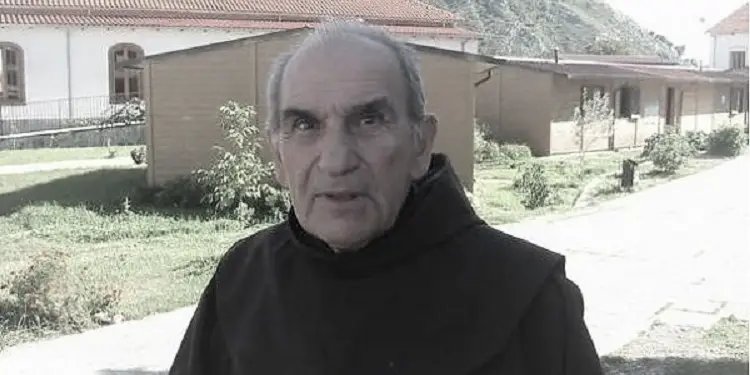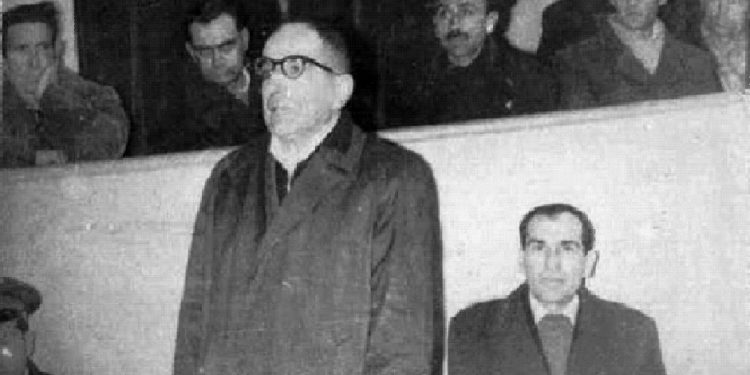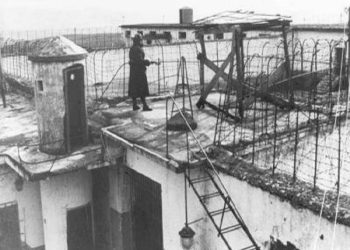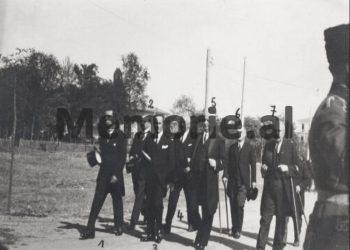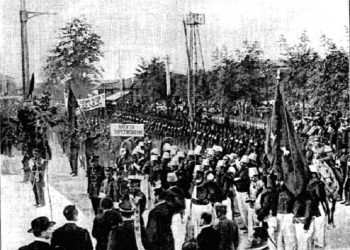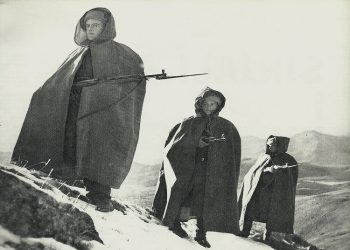From Ndue Ukaj
-Át Zef Plumi; the free thinker and imprisoned Albania-
Memorie.al / When I read Át Zef Pllumi’s book of memoirs, “Live only for me to show you”, two Albanias appear in front of me: one that represents the author of these memoirs, who, although in prison and among cruel tortures, lived free with their own thoughts, and another isolated and imprisoned, in which all those who loved true freedom were persecuted and tortured. And, in the great line of those who loved this freedom and sacrificed for it, Át Zefi was exemplary, and a line of clerics and educated laymen, who at that time, constituted the most progressive elite of Albania.
The Golgotha of Át Pllumi’s confessions, included in the monumental book, “Live only for show me”, is the story of the author’s personal memories, but essentially and objectively, it is also the history of Albanian communism, with all the typologies and events that characterized it , with the real face of ugliness and savagery, with which the brutal regime suppressed true human freedom.
In this way, his personal narratives, objectively, remain permanent historical references, to understand the truth of the wild communist winter in Albania.
Át Pllumi, sad, one day reads it on the wall of the WC, where he suffered the absurd punishment: “Un Dom Vlash Muçaj, here on July 22, I drank my urine, so that I wouldn’t be thirsty.”
“I was horrified”, Pllumi writes and asks: “Do you say man reaches that far, worse than an animal? Throughout the book, where various topics are discussed and dramatic situations are described, the careful reader asks the same question hundreds of times.
Throughout the narration of his prison memories, his relationship with other authors, especially with the Franciscan friars, the reader encounters macabre scenes: how a living man, tied hand and foot to a dead man for three days, encounters a hungry and thirsty man, with rats on the body, with lice on the head, the despised, the shot, and also, you see the hero of the story, Át Plumi, who never humbled himself and never gave up his convictions and true human nature. This is an example for everyone. This is the figure that should be followed by all people who want to put themselves at the service of kindness, justice and humanity.
Ten years have passed since the merciful Father closed his eyes, while his work has become a beacon of light to understand the mysteries of communism. Violated and imprisoned, he loved Albania and its freedom, with wounds in his soul and body, even though it gave him horrors, endless and inhuman suffering.
During several decades, in prisons and labor camps, he experienced in his soul and body the fierce hatred of the Enverist dictatorship, but he always preached with full confidence that: “love is not established by violence.” In this way, today he remains an exemplary figure – the conscience of free Albania – and a divine counterweight against evil.
Át Marin Sirdani, author of many valuable texts on Albanian culture and history, member of the Franciscan school, this school that became an institution of Albanian national emancipation, after having a conversation with Át Zef Pllumi, addressed him in an imperative form: ” Brother Zef, I am Superior for today: I am giving you the order: go, run! Just to show me!”
Át Zefi did not run away, but lived in prisons, camps, despised and tortured, but never succumbed to the hurricane of totalitarianism, which alienated people and made them useful tools for extending the utopia of equality, between people and class war, in the name of which ugly crimes were committed.
Describing his time in prison, Át Zef Pllumi says: “I spent my life in prison, but a free thinker.” This freedom of his, meanwhile, was missing from the other Albanians, who had total power, and the opportunities to do whatever they wanted: to slander and fabricate against everyone, to kill and humiliate everyone, especially the weak.
The freedom of Át Zeft did not depend on the ideological shackles of hatred, but was rooted in the conscience formed by human principles. And this freedom became the essence of his great work, as a personal confession of a humble man, who, in order not to lose his spirituality, is imprisoned, tortured, humiliated, but not alienated. Because freedom of conscience is the ontology of human existence that transcends ideologies, nations, states, and religions.
Anyone who reads the monumental book of confessions; “Rrno just to tell me”, there is no way not to cry and ask the question that a great writer, who also suffered in the concentration camps, Primo Livi asked: “Is he, really, a man”?!
Every conscientious Albanian, when reading the memoirs of Át Pllumi, asks: where was the man in that communist defeat, where the feelings of human love were few? Yes, every reader, after finishing reading Át Pllumi’s book, cannot help asking a series of other questions, each one more complex than the other. How is it possible that in the name of freedom, a regime oppresses and kills its own people?
The characters of Át Zefi’s work are well-known personalities, most of them distinguished names in the history of Albanian culture, meanwhile, the totality of the spiritual features that they represent radiate light in the communist darkness, where Albania was trapped. In this way, his stories, today and forever, remain a school of love against violence, of humanity against hatred, of goodness against evil, of the right path against iniquity.
After a decade in eternity, we see how his memories are as necessary for national health as air, bread and water. Because they are stories against indolence, scumbags, who do not like the lighting of a nation’s path, they are stories against historical amnesia and totalitarianism of any form.
But, from the trenches of a terrible cruelty, Át Pllumi brought out stories without which our knowledge of that era would be very incomplete.
Át Zefi’s memories are a school for life, where he shows how man, to save his conscience and freedom, becomes friends with the wolf, and will not fall into the hands of people who were worse than the beast of the mountains. Yes, Át Zefi, in his memoirs, tells how a man hiding in the mountains made friends with the wolf, for whom he is very upset when he is killed, and refused to become part of the horror schemes that attempted to alienate man.
The scene of the man’s friendship with the wolf is one of the most moving and nightmarish episodes of the memoir, “Just Tell Me.” Father, says Át Zefi, when he heard a crack on the mountain, he says, “I thought the disk in my heart cracked”, and continues: “I had a concern. Are you saying, – I said to me, – they killed my wolf? The character Pllumi tells about, after learning the truth about the killed wolf, in a dialogue with the shepherd, tells him: “that wolf was more faithful than any man”!
This collision, so dramatic and so unusual, is the philosophy of two opposite worlds that collided in these memories: that of the endless hatred that the regime exercised against its own people, and also, of the endless love that the opponents of this evil showed for Albania and her own freedom.
The memories of Át Pllumi, forge a story of nightmare and freedom, where the furious power of the man who does not love man is expressed, of the man who is less loyal to man than the wolf, and to him who fights to the maximum for the freedom of man and own country.
These two worlds permeate the book from end to end, as reflections of the permanent clash between good and evil, love and hate. In this clash and in this world full of hatred, he was in prisons and torture, humble, he was never tempted by all kinds of temptations, iniquity, but he remained human until the end.
And today, he appears to us as the sun that illuminates the darkness, after a long, icy winter. Yes, today he is the great asset of all those who want to learn the truth about communist Albania and its relations with the Albanian and foreign world. He and his work are also proof that evil, no matter how great, one day comes to an end, and atrocities are left behind: a lesson for future generations.
Does good win over evil? – This is probably one of the most serious questions that Át Zefi’s memoirs confront us with.
In the face of a ferocious apparatus enraged by hatred, in the face of an unemancipated political class, which closed schools, magazines, religious institutions, shot people, suppressed true nationalism, in the name of utopian internationalism, concocted all sorts of nonsense in the name of war classes, only to degrade and humiliate man, the wise friar sat and recorded the good evidence of the dictatorship, which, after his release, he neatly immortalized in the book, to give to the Albanian and foreign world, as permanent evidence of the great suffering that communism caused in Albania.
Father, – writes Át Pllumi, – Albanian politics was planned in Belgrade and according to the principle of Slavic-Albanian communism: Cartago delende est (Katargena must be destroyed!”) Albanian communists wanted to destroy everything related to Western tradition and values, especially the institutions of the Catholic Church, of the Albanian intelligentsia, and all those who did not approve of the inhumane regime, which ate its own children like a wolf.
Undoubtedly, the peoples who read such a work find it difficult to fall into moral misery. Because his stories are the sparks of freedom, which build another sun over the dull Albania: the sun of freedom and independence.
Át Pllumi, miraculously escaped from the clutches of communism and his salvation, has a divine provenance. He is predestined to narrate and bring out of oblivion a timeless time. And so, he carved the wild face of Albanian Enverism, and showed the resistance force of a great institution that the Franciscan Province built in Albania.
Át Zefi, as a student, was fortunate to be educated and advised by great figures of Albanian culture and from whom he learned valuable things. And he made those lessons part of his life and writings.
Today, a decade after his death, his work challenges our conscience once again; it confronts us once again with man, in his ontological being.
The book of memories “Live only to show me”, is a masterpiece against totalitarianism, while the author’s life is an example of a person embodied with humanity and Christian love – with that love that transcends the goals of any doctrine: for peace and goodness.
A decade between us, his work, although not in the desired way, has become a temple of national catharsis, where all those who lived and served the horror of communist terror can learn, confess and repent. In this work, also, souls thirsty for freedom, justice and peace can find rest.
Above all, on the tenth anniversary of the author’s death, the Albanian society, more than ten years ago, needs to bring the great author back to the work table, so that his valuable work is done properly, for cultural and political health of Albanians.
The work of Át Zef Pllumi, “Rrno only per me tregue” is a capital work, which with the typology of writing, wanders between memoirs and history, literature and philosophy. Undoubtedly, it is a unique work, unrepeatable in the history of writing, written in an extraordinary style and with a resounding language, which shows the intellectual power of the author, his talent and encyclopedic knowledge.
After a decade of author immortality, we realize that some books are more valuable than others, and that some masterpieces are more useful than others. “Just show me” remains one of the most thrilling and at the same time most educational masterpieces against any wild form of power that challenges man.
Therefore, today and forever, writes the writer Ismail Kadare: “The entire Albanian society needs this work. Those who lived through that time need it, as much, if not more, those who didn’t. They need the oppressed and the downtrodden, and just as much, if not more, those who oppressed others. The anti-communists need it, and the communists just as much, maybe even more. In short, our conscience needs it”.
The book of memories of Át Zef Pllumi, today and forever, remains as a silence that pierces the wild heart of communism and its disciples, who never repented and never asked for forgiveness, for the endless sufferings caused to Albanians, during the darkness of during the communist period, when man was degraded and shrunk to the level of an animal.
The work, “Just tell me”, is an autobiographical book, which with its characteristics and typology, belongs to memoir writings, where we meet a whole gallery of real characters from the history of Albanian culture.
The author, in this work, frankly tells about his relations with the characters of the time, with names and surnames; tells about the spectacles made by the state that was sleeping in crime with justice, the confessions inside the cells and in the labor camps; for Shkodra and the great love of the Franciscans, for the Albanian culture, as well as for the culture of death that the Albanian communists planted.
These memories are written in a high style, with admirable language, where there is no lack of striking metaphors, amazing stylizations, and a range of artistic qualities, which make this work a masterpiece of the history of Albanian culture, and one of the best books ever written against totalitarianism. Memorie.al






